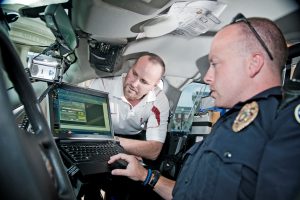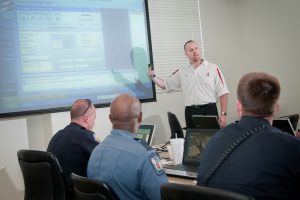
As the law enforcement officer pulls his cruiser to the side of the interstate behind the other car, he’s apprehensive about the driver’s potential reaction. He glances at the license plate and steps from the car to walk toward the other vehicle. His muscles tighten; awareness is heightened.
He’s concerned not only with the driver who is about to be cited, but he’s also paying attention to all the other cars zipping by. Experience demands calmness, and knowledge provides assurances of safety.
That safety comes from knowing vital information before the law enforcement officer even approaches the vehicle. Through LETS, or the Law Enforcement Tactical System, the officer accesses a secure Web-based search engine and reviews multiple databases with one simple query.
LETS, a Google-like search engine, allows the officer to find out vehicle information through a license plate search that gives the vehicle registration and possible warrants. After the officer gets the driver’s license, a simple scan provides the defendant’s violation data and the driver’s license photo to help aid in positive identification of warranted individuals.
Through innovative programs, like LETS, and the dedicated cooperation among numerous state agencies, The University of Alabama’s Center for Advanced Public Safety is taking traditional computer science applications and developing new solutions for society’s overall benefit. The center, known as CAPS, began at the Capstone as the CARE Research and Development Lab, and initially focused on the CARE software for traffic safety. Today, with more than 35 faculty and researchers, the focus is on software development for law enforcement applications and working extensively with Alabama state and local agencies.
While the end result of the center’s focus is supplying law enforcement officers with easy-to-use products enhancing the officer’s efficiency and safety, the CAPS team has overcome a tremendous barrier in most states: interagency communication. The Alabama justice departments work with the police, courts and local agencies to streamline systems through the use of modern technology – and guided by the CAPS programs. Secure use of the Internet and new mobile data technologies are designed to improve the communication efforts of these various agencies.
Used by more than 1,600 safety officers
One of the new mobile data projects incorporating a conventional laptop or a tablet PC is known as eCite. This project enables officers to issue tickets electronically through CAPS’ electronic citation software. The officer prints the violator’s ticket at the vehicle, and then the tickets are electronically-transmitted directly to the Administrative Office of Courts in Montgomery. The data is automatically in the court system and does not have to be re-entered by the district court’s clerks.
eCite is used by more than 600 state troopers and 1,000 officers at 300 local agencies. During eCite’s first full year of trooper deployment in 2007, usage of electronic citations increased from just 7 percent to more than 66 percent. Today, about 90 percent of all citations are electronic. To date, more than 1.6 million citations have been issued and processed through the electronic software system.

“eCite is a great tool for law enforcement,” says Sgt. Scott Banks of the Gardendale Police Department. “It is a tremendous benefit to any law enforcement agency. I find the officers in my division continuously talking about the success of this new program for our department.”
One of the most dangerous times for an officer is on the side of the road issuing tickets. The electronic software decreases the amount of time issuing the ticket, making highway and roadway enforcers safer.
NO MORE DECIPHERING HANDWRITING
In addition to safety, the eCite program reduces errors as court clerks no longer need to decipher handwriting, and data entry is minimized because the citation is entered once instead of multiple versions from the officer and the courts. Because tickets are entered electronically, the justice departments have decreased the backlog of tickets to enter even though there are more tickets, resulting from the increased speed in issuing tickets and the ease in issuing multiple citations to the same defendant.
Similar to the electronic citation program, eCrash is an electronic crash form and transmission procedure launched in 2009. Once fully adopted statewide near the end of 2009, the program will eliminate the paper crash forms. Its integrated street-drawing-and-diagramming tool speeds up the report process. The eCrash software validates reports quicker, and the immediate data entry improves timeliness of the data, especially beneficial for drivers needing the report for insurance purposes.
“The ability to import various pieces of information relating to locations, vehicles, drivers and witnesses is a significant time saver,” says Sgt. Mark Bishop of the Shelby County Sheriff’s Office. “In addition, the ability to print copies of accident reports from an Internet-based application has made the retrieval of accident reports more efficient.”
In order to house these various applications, CAPS developed the Mobile Officer Virtual Environment. The MOVE software is the umbrella for these applications, similar to how Microsoft Office is the comprehensive platform for Word, Excel and PowerPoint. MOVE integrates several software applications and peripherals, including LETS, eCite, eCrash, an incident/offense report called ULTRA, and ASPEN, which is a federal electronic reporting system.
GPS has been added so officers can capture their location for eCite tickets and eCrash reports, and Microsoft MapPoint is an option for officers needing mapping capabilities. MOVE also allows the information to be exported into the officer’s daily log activities.

Traffic safety issues have also been dramatically enhanced through CARE – the Critical Analysis Reporting Environment – CAPS’ original crash data analysis program. By generating significant statistical data, traffic safety problem areas have been identified and countermeasures for prevention have been developed.
From determining high-crash locations, examining times of alcohol-related crashes, and identifying the high crash days of the year, CARE has assisted numerous state agencies in saving lives through preventative patrols. Mapping crashes also helps enforcement agencies disperse officers more effectively and efficiently.
Research for Future Safety Applications
CAPS is actively working to expand these programs to other municipalities, states and law enforcement agencies. Since its development more than 20 years ago, the CARE software has been implemented in 12 states. Other agencies, such as the Alabama Marine Resources and the Department of Revenue, requested development of a non-traffic form to use in eCite, and CAPS recently delivered and started training on these new forms.
A new concentration area, in conjunction with UA’s criminal justice department, is designing software to help identify likely suspects in criminal cases. Through access to various mapping programs and multiple databases, such as LETS, the research team is working on programs that would identify suspects based on specific demographics and geographics. Although this program is in the early development phase, the team has received positive results from initial testing.
The next time you see the lights flashing on the side of the road, remember these officers and troopers are working to keep you safe. By applying traditional computer science techniques to specific problems in society, UA’s Center for Advanced Public Safety continues enhancing the state’s judicial and public safety offices serving citizens.
